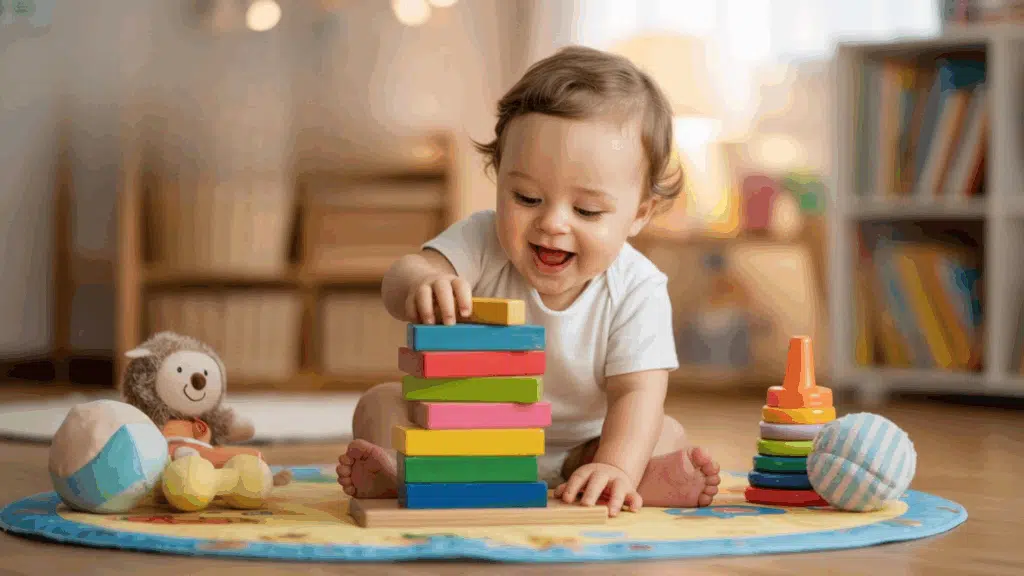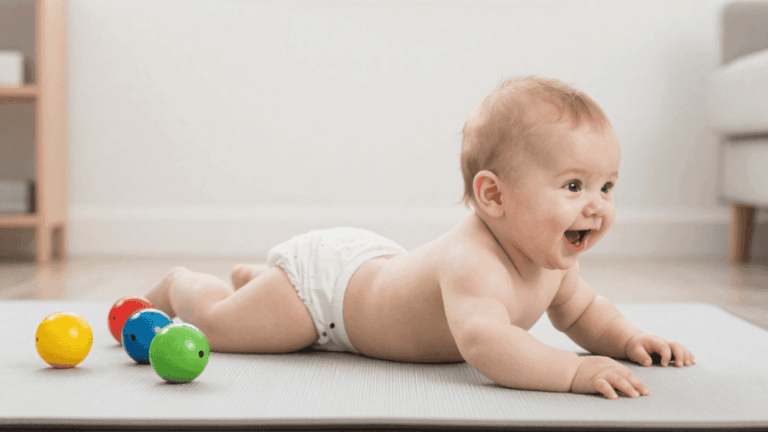Here’s a secret most parents don’t know. Your baby’s brain is working overtime right now. Every second, millions of neural connections are forming. But here’s the catch – you can actually speed up this process with simple activities that cost nothing.
Most parents think expensive toys and fancy programs will make their babies smarter. Wrong. The most powerful brain-boosting tools are already in your hands.
Talking about activities so simple you’ll wonder why no one told you sooner. Things you can do while feeding, bathing, or just hanging out with your little one.
These aren’t complicated exercises that require special training. They’re fun, easy activities that will make your baby giggle while secretly building their brain power.
What is Infant Cognitive Development?
Infant cognitive development is how babies learn to think, understand, and make sense of the world around them from birth to about 18 months old.
When babies are born, their brains work like sponges that soak up everything they see, hear, and feel, creating new connections every day.
In the first few months, babies learn to recognize mom and dad’s voices, follow moving objects with their eyes, and smile back when someone smiles at them.
As they grow, they reach for toys, put everything in their mouths to explore, play peek-a-boo, copy sounds and gestures, and eventually say their first words and follow simple instructions.
Good cognitive development sets the foundation for learning to read, solving math problems, and thinking creatively later in life.
Benefits of Cognitive Activities for Infants
Engaging infants in cognitive activities offers powerful benefits for their early development:
- Boosts Brain Development – Stimulates neural connections during a critical growth period.
- Enhances Memory and Attention – Encourages focus and early recognition skills.
- Supports Language Development – Builds listening and early communication abilities.
- Promotes Problem-Solving – Encourages curiosity, exploration, and decision-making.
- Improves Motor Skills – Links thinking with movement through hands-on play.
- Strengthens Parent-Infant Bond – Shared activities build trust and emotional security.
- Encourages Social Awareness – Helps infants understand emotions, expressions, and interaction.
These early activities lay the groundwork for future learning, behavior, and emotional health.
Fun Cognitive Activities to Boost Your Baby’s Brain

Cognitive activities to support your baby’s brain development. From sensory play to interactive games, help your little one grow through everyday moments.
1. Peek-a-Boo
Objective: Strengthens understanding of object permanence.
This timeless game teaches babies that even when something disappears, it still exists. Playing peek-a-boo engages babies’ attention, fosters their curiosity, and encourages cognitive development by helping them grasp the concept that things are still there even when hidden.
Supplies Needed: None
2. Mirror Play
Objective: Enhances self-awareness and focus.
Babies love looking at their own reflection, and this activity helps them recognize themselves, promoting self-awareness.
It also helps improve eye focus and attention span as they explore the world around them.
Supplies Needed: A baby-safe mirror
3. Tummy Time
Objective: Promotes muscle strength and motor skills.
Tummy time is essential for building neck, shoulder, and back strength, which are critical for motor skills development, including crawling and sitting up.
It also promotes spatial awareness as babies learn to lift their head and interact with the world.
Supplies Needed: A soft, clean blanket or mat
4. Reading Aloud
Objective: Develop language and listening skills.
Even if babies don’t understand the words, hearing stories and words aloud helps them absorb language patterns and build listening skills.
This early exposure to books and language can also set the stage for later literacy development.
Supplies Needed: Picture books or soft fabric books
5. Singing Nursery Rhymes
Objective: Boosts language development and auditory skills.
Singing rhymes with repetition and rhythm helps babies absorb language patterns, boosts their memory, and teaches them the musicality of speech.
Nursery rhymes are great for bonding and can make language development more fun and interactive.
Supplies Needed: None (just your voice!)
6. Interactive Block Play
Objective: Encourages problem-solving and fine motor skills.
Playing with blocks helps babies understand basic concepts like stacking, balance, and cause and effect.
They also develop hand-eye coordination, fine motor skills, and problem-solving abilities as they figure out how to build and knock down structures.
Supplies Needed: Soft or wooden building blocks
7. Cause and Effect Toys
Objective: Teaches cause and effect relationships.
Toys that respond to actions, such as making sounds or lighting up, help babies understand the concept of cause and effect.
These toys provide immediate feedback to the baby, making learning interactive and engaging.
Supplies Needed: Rattles, toy cars, or interactive toys with buttons
8. Memory Games
Objective: Boosts memory and concentration.
Simple matching games help babies strengthen their memory by encouraging them to recognize and recall patterns or objects.
This activity is essential for cognitive development and improving focus and attention.
Supplies Needed: Matching cards or toys
9. Baby Safe Puzzles
Objective: Develops problem-solving and fine motor skills.
Introducing simple puzzles helps babies improve critical thinking, hand-eye coordination, and fine motor skills.
As babies figure out how to fit pieces together, they learn about shapes, patterns, and problem-solving.
Supplies Needed: Soft, baby-safe puzzles
10. Exploring Textures
Objective: Stimulates sensory development.
Exposing babies to different textures through touch helps them develop their sense of tactile awareness.
Exploring various materials (smooth, rough, soft, etc.) stimulates their brain and contributes to their cognitive development.
Supplies Needed: Textured fabrics, soft toys, or sensory mats
11. Talking to Your Baby
Objective: Builds language comprehension and emotional bonding.
Regularly talking to your baby, even if they can’t respond with words, helps them understand the rhythm and structure of language.
These interactions also promote bonding and emotional connection.
Supplies Needed: None
12. Rattles and Shakers
Objective: Enhances auditory and visual tracking.
Shaking a rattle or other noisy toys helps babies develop their ability to track moving objects and recognize sounds.
These toys also encourage babies to reach out, improving their motor skills and coordination.
Supplies Needed: Rattles, shakers, or any sound-making toy
13. Imitation Games
Objective: Promotes cognitive and motor development.
Babies love mimicking their parents or caregivers. Encouraging them to copy actions like clapping, waving, or sticking out their tongue helps develop their memory, coordination, and social skills.
Supplies Needed: None
14. Sorting Toys
Objective: Boosts classification and problem-solving skills.
Sorting toys into different categories (such as shapes, colors, or sizes) helps babies develop their ability to categorize objects and think critically.
It enhances cognitive abilities and supports early problem-solving skills.
Supplies Needed: Sorting toys with different shapes, colors, or sizes
15. Ball Play
Objective: Improves coordination and motor skills.
Rolling or gently tossing a soft ball encourages babies to practice their hand-eye coordination, reach, and motor skills.
It’s also a fun way to introduce babies to the concept of movement and action-reaction.
Supplies Needed: Soft, baby-safe ball
16. Crawling Games
Objective: Strengthens motor skills and spatial awareness.
Encouraging crawling helps babies develop coordination and strengthen muscles needed for crawling, sitting, and walking.
It also promotes exploration, which is essential for cognitive growth.
Supplies Needed: None (just a safe, open space)
17. Nature Walks
Objective: Stimulates curiosity and sensory development.
Taking your baby on a walk outdoors introduces them to new sights, sounds, and smells.
This sensory stimulation is beneficial for cognitive development, and the fresh air and movement support physical development too.
Supplies Needed: Stroller or baby carrier
Tips for Parents and Caregivers
- Talk All Day Long: Talk to your baby constantly, even when they can’t talk back yet. Describe what you’re doing, like “Now I’m changing your diaper” or “Look at the red ball.” This helps them learn language patterns.
- Read Books Together: Read to your baby every day. Don’t worry if they seem more interested in chewing the pages than listening. The sound of your voice and seeing pictures helps their brain grow.
- Play Simple Games: Play peek-a-boo, pat-a-cake, and other games that make them laugh and think. These activities teach cause and effect while building memory skills.
- Provide Safe Exploration: Give them safe toys to explore with their hands and mouths, like soft blocks or rattles. Babies learn about the world through touch and taste.
- Make Faces and Sing: Sing songs and make silly faces. Babies love watching expressions change, and music helps with brain development and emotional bonding.
- Start Conversations: Respond when your baby makes sounds or gestures. Copy their noises back to them to start early conversations and show them communication works both ways.
- Limit Screen Time: Keep screen time very limited for babies under 18 months. Real human interaction works much better for brain development than phones or tablets.
- Ensure Good Sleep: Make sure your baby gets plenty of sleep. That’s when their brain processes everything they learned during the day and forms important connections.
The Bottom Line
Your baby’s brain is building millions of connections every single day.
The simple activities we’ve shared aren’t just fun games – they’re powerful tools that shape how your child will learn, think, and grow for years to come.
Start with one or two activities that feel natural to you. Make them part of your daily routine. As your baby grows and responds, you’ll see their curiosity and understanding bloom.
Ready to give your little one the best start possible? Pick an activity from our list and try it today. Your baby’s brilliant future begins with these small, loving moments.
















